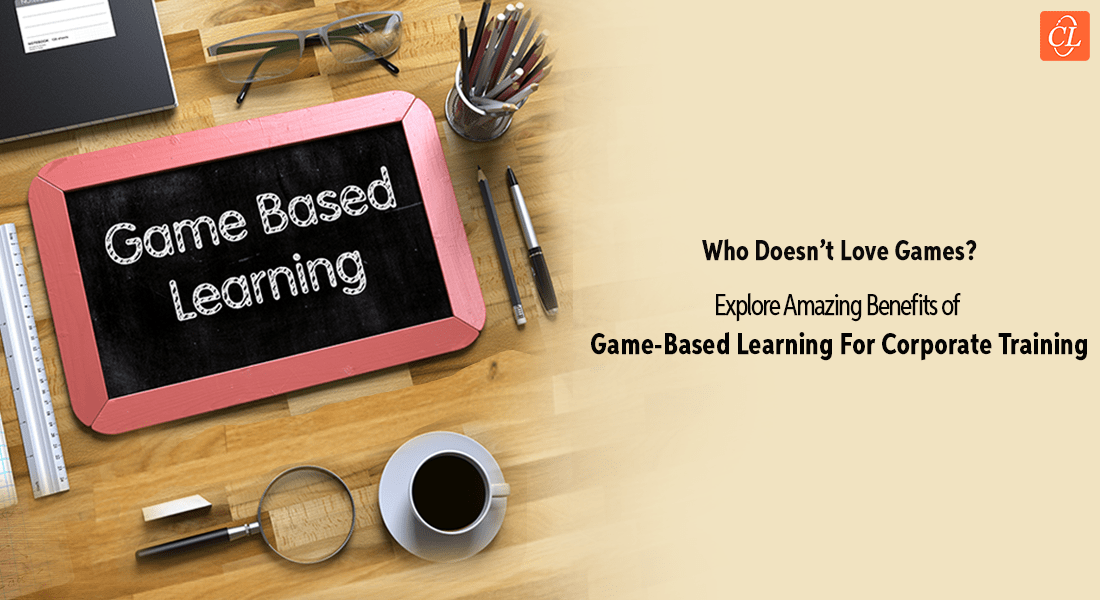5 Ways How Game-Based Learning is Beneficial for Corporate Training

I bet everyone has played at least one game in their life and learned something through it. Now, that’s totally relevant considering the current eLearning methods used for corporate training. Games are helpful to a great extent when it comes to engaging the learners and due to their overly dynamic nature, games can turn out really productive sometimes. Game-based learning has been a crucial technique to help learners understand a lot of distinct contexts. The best use cases of game-based learning can be online compliance training, sales training, and safety training. Here are 5 influential ways game-based learning can be beneficial for corporate training.
Do You Think of Game-Based Learning as a Distraction?
Please don’t, because game-based learning can:
- Improve Engagement and Motivation
- Encourage Advanced Reasoning and Critical Thinking
- Offer Swift Feedback
- Help to Develop Distinct Skillsets
- Promote Social Learning
Read on to gain detailed insights on each of these benefits mentioned above.
Top 5 Ways Game-Based Learning is Beneficial for Corporate training
1. Improves Engagement and Motivation
It is a common myth that games only work as a form of distraction while they clearly serve a better purpose than that. Games can increase a learner’s engagement to a great extent because of the pre-justified goals and objectives that motivate the user to achieve them. Basic features of a game include feedback, choice, rewards, and leaderboards, and all these features keep the user engaged with the content and motivated towards their end goal.
For example, in a game where the learner is role-playing as a restaurant manager and has to carry out a different set of activities and challenges in a given time and every action can change the course of the game. This helps the learners improve their customer satisfaction and time management abilities as well. This can improve the engagement of learners and motivate them to perform better every time they replay a situation they failed at or make new records to stand above others on the leaderboard. Game-based learning is indeed one of the most effective instructional design strategies currently.
Access this free webinar recording to explore other effective instructional design strategies.
2. Encourages Advanced Reasoning and Critical Thinking
Games belong to various genres, and every genre provides different benefits to the users. One of the benefits of a few genres such as strategy or mystery games can be the improvisation of advanced reasoning skills of a learner along with a noteworthy improvement in critical thinking. Both of these benefits are prominent for an individual’s personal growth and game-based learning can serve the purpose pretty well. Decision-based games improve reasoning and critical thinking abilities, which would eventually help the employees make their own decision if they are confused about anything at work.
Arcade games and simulation-based games can help employees improve their critical thinking, understand what can be the outcome of each decision they make, and proceed accordingly. Mystery and detective games where an employee can play as a supervisor and the goal is to take care of the workplace and suspect any malpractices. This type of game can improve the advanced reasoning and supervising abilities of an employee while helping them with compliance training altogether.
3. Offers Swift Feedback
When you play a game, and any supported action is performed, the action is often followed by an instant feedback whether that action is in your support or against the desired goal. Suppose you are playing a puzzle game and 45 seconds are remaining to complete the given puzzle, game prompts the requirements to successfully finish the puzzle along with the time remaining. If you tend to misplace the piece of a puzzle, the game prompts that the place is wrong, if you are close to your goal in a record time, the game prompts exactly that, and so on. Basically, whatever course of action you perform, subsequent feedback for that action is provided to the user in no time.
Swift feedback in game-based learning helps the employees understand their faults and perform better every time they initiate an action. Feedback lets you know when you are in the wrong direction before it’s too late and game-based learning does exactly that. It doesn’t let you go on the wrong path multiple times without correcting you. There are likely very less chances of a learner performing the same mistake multiple times because when they make that mistake once, they get notified instantly, which prevents the same mistake from happening again. The best use cases can be safety training sessions where all sorts of mistakes are meant to be precisely understood.
4. Helps to Develop Distinct Skillsets
Skill development is one of the core values in employee training that can’t be overlooked. Certain fields of work require exquisite skills that need to be polished every now and then. Games can be of great help to nurture such skills and maintain them for a long time. Games are made with a sense of personality development in mind and due to their versatile nature, every game can help to develop some sort of skills that can be proved helpful in real-life scenarios.
Games such as Dr. Driving and Flight Simulator can help you understand the core basics of driving a car or flying an airplane whereas games like Call of Duty or Battlefield can help you understand the basic functioning of guns and related equipment. There are games that can improve your reaction time, visionary skills, hand-eye coordination, or even academic skills such as mathematics or physics. In a nutshell, every game has something productive to offer that improves the individual personality of an employee if they are played with the right mindset.
5. Promotes Social Learning
Apart from personal growth and engagement, games are equally popular as a medium that promotes a collaborative approach among users. Learners can play a lot of games with each other and learn whatever they wish to. Collaborative games can help the employees complete a challenge together, which encourages teamwork. It should be safe to mention that a team can come up with more innovations than a single individual, this is where game-based learning is best suited, it allows the employees to understand each other better, form teams, and work towards the desired goal as a team. Social learning can give rise to healthy competition among employees that can motivate them to push themselves a bit more than required to achieve merit.
Parting Thoughts!
Games are often degraded as a distraction while they are quite beneficial when played with the right narrative. Games can be a hobby, a time killer expert, an effective way to encourage learning, or a great practical approach for various corporate training sessions. Precisely, games can be whatever you want them to be. Organizations should try to come out of their closet and encourage games within their training sessions to engage modern learners as monotonous traditional training sessions are definitely not capable of driving such immense engagement.
As much as games are a part of modern training sessions, it is not the only format available. There are other various eLearning trends that are equally impactful in today’s world. Try this free e-book to explore these modern eLearning trends to scale your corporate training to the next level and make learning effortless.




![What is eLearning: 8 Characteristics and 6 Advantages! [Infographic]](https://blog.commlabindia.com/hubfs/Imported_Blog_Media/basics-of-elearning-infographic-1.jpg)
![6 Benefits of AI-Powered Gamification in Employee Training [Infographic]](https://blog.commlabindia.com/hubfs/blogs/benefits-ai-powered-gamification-employee-training-infographic.jpg)